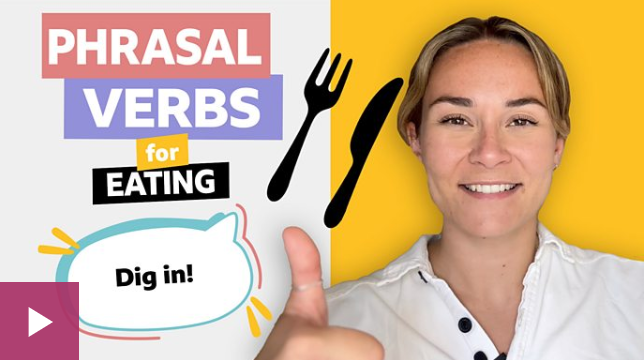Introduction
Georgie teaches you some phrasal verbs that can be used to talk about eating.
Phrasal verbs mentioned
snack on (something)
eat small amounts of something casually, between meals
- She likes to snack on almonds while she works.
- The kids were snacking on biscuits while watching the film.
munch on (something)
eat something casually, usually in a way that makes a crunching sound
- He’s munching on his apple.
- They munched on popcorn at the cinema.
dig in or tuck in (to something)
start eating excitedly or enthusiastically. Often used to give people permission to start eating
- The food looks delicious — let’s dig in!
- The children tucked into their pancakes with delight.
eat up or eat (something) up
finish all the food on your plate. Often used as an imperative
- Eat up! You’ve got a big day tomorrow — you’ll need the energy!
- You’d better eat up all your vegetables before you leave the table!
pig out
eat a lot of food in a greedy way, often more than you need
- After the long hike, she pigged out on sugary doughnuts.
- We usually pig out on snacks when we have movie nights.
eat out
eat somewhere outside of the home, like a restaurant or cafe
- I love eating out, but it can be expensive if you do it all the time.
- We’ve got no food in the house, so why don’t we eat out this evening?
TOP TIPS!
- If you see the word ‘something’, it usually means the verb requires an object.
- If ‘something’ is in the middle of the phrasal verb, it means that it can be separated by the object (but doesn’t have to be).
- If ‘something’ is at the end of the phrasal verb, it means it cannot be separated.
- When a pronoun, e.g. him, her, them, is the object of a separable phrasal verb, it must go between the verb and the particle.
